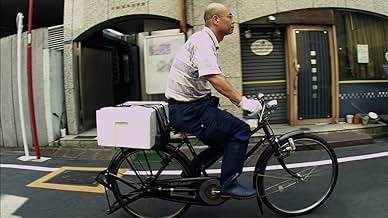A documentary on 85-year-old sushi master Jiro Ono, his renowned Tokyo restaurant, and his relationship with his son and eventual heir, Yoshikazu.A documentary on 85-year-old sushi master Jiro Ono, his renowned Tokyo restaurant, and his relationship with his son and eventual heir, Yoshikazu.A documentary on 85-year-old sushi master Jiro Ono, his renowned Tokyo restaurant, and his relationship with his son and eventual heir, Yoshikazu.
- Awards
- 3 wins & 12 nominations total
Takashi Ono
- Self
- (uncredited)
Storyline
Did you know
- TriviaIdeally, the components of sushi should be served at two different temperatures. The rice should be body temperature for best rolling and pressing qualities, and the topping (usually fish) should be room temperature for best flavor. The apprentice preparing the rice places it in an insulated container to keep it at the correct temperature.
- Crazy creditsIn the Special Thanks section, "The Tsukiji Fish Market" is listed twice.
- ConnectionsEdited into Independent Lens: Jiro Dreams of Sushi (2013)
- SoundtracksConcerto for Violin and Orchestra In D, Opus #5: I, Allegro Moderato, Cadenza
Written by Pyotr Ilyich Tchaikovsky
Performed by Jascha Heifetz, London Philharmonic Orchestra and John Barbirolli
Featured review
Jiro is not an easy celebration of sushi - it is certainly not simply stunning shots of food on plates - it is rather a more difficult and even challenging film about the complex nature of obsession, perfection, and the discipline and almost OCD behavior that it takes to become the world's best.
Jiro is acknowledged as the world's best - his restaurant in a pass in an underground station in Tokyo sits 9 people at a time, has to be booked at least a month in advance, and costs the best part of a week's wages. Yet no-one would hesitate - this is, as Michelin recognizes, worth a trip to Japan just to go and eat there.
The film succeeds as it is itself a near perfect reflection of the same ethos - it becomes apparent very quickly that this is not sentimental romantic filming - it chooses to avoid rich color, and in the editing and, in particular, the composition of the shots is singularly well-thought through. Many shots are based on the golden mean, and placed exactly two-thirds to the right of frame - and there is throughout a sense of real thought and balance. The Peter Greenaway-like score add to the general sense of rhythm and balance here.
The documentary itself is particular and peculiar - it is not in itself a documentary that embellishes - it focuses on Jiro, his sons, their suppliers, the apprentices, the produce, and the product - but we always feel that there are more stories untold than told here - Jiro is not, in the main, likable - but he is totally and utterly committed and passionate to the point of coldness about his process - in a way that few are anymore - and in this sense the film is also more an elegy than a eulogy - Jiro's work ethic is gone forever even now - who wants to work 16 hours a day for 75 years anymore?
We are watching the recording of extinction, and it is still beautiful. So we end up with a stark yet beautiful film that both records the passing of greatness and questions it. It is certainly one of the best documentaries of 2012.
Jiro is acknowledged as the world's best - his restaurant in a pass in an underground station in Tokyo sits 9 people at a time, has to be booked at least a month in advance, and costs the best part of a week's wages. Yet no-one would hesitate - this is, as Michelin recognizes, worth a trip to Japan just to go and eat there.
The film succeeds as it is itself a near perfect reflection of the same ethos - it becomes apparent very quickly that this is not sentimental romantic filming - it chooses to avoid rich color, and in the editing and, in particular, the composition of the shots is singularly well-thought through. Many shots are based on the golden mean, and placed exactly two-thirds to the right of frame - and there is throughout a sense of real thought and balance. The Peter Greenaway-like score add to the general sense of rhythm and balance here.
The documentary itself is particular and peculiar - it is not in itself a documentary that embellishes - it focuses on Jiro, his sons, their suppliers, the apprentices, the produce, and the product - but we always feel that there are more stories untold than told here - Jiro is not, in the main, likable - but he is totally and utterly committed and passionate to the point of coldness about his process - in a way that few are anymore - and in this sense the film is also more an elegy than a eulogy - Jiro's work ethic is gone forever even now - who wants to work 16 hours a day for 75 years anymore?
We are watching the recording of extinction, and it is still beautiful. So we end up with a stark yet beautiful film that both records the passing of greatness and questions it. It is certainly one of the best documentaries of 2012.
- intelearts
- Jul 13, 2012
- Permalink
- How long is Jiro Dreams of Sushi?Powered by Alexa
Details
- Release date
- Country of origin
- Official sites
- Language
- Also known as
- Nghệ nhân Sushi
- Filming locations
- Production companies
- See more company credits at IMDbPro
Box office
- Gross US & Canada
- $2,552,478
- Opening weekend US & Canada
- $42,035
- Mar 11, 2012
- Gross worldwide
- $2,692,864
- Runtime1 hour 21 minutes
- Color
- Sound mix
- Aspect ratio
- 1.78 : 1
Contribute to this page
Suggest an edit or add missing content





















